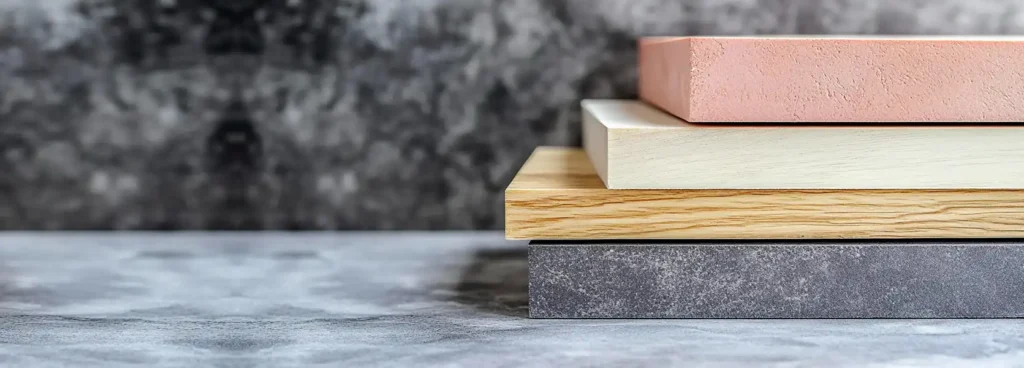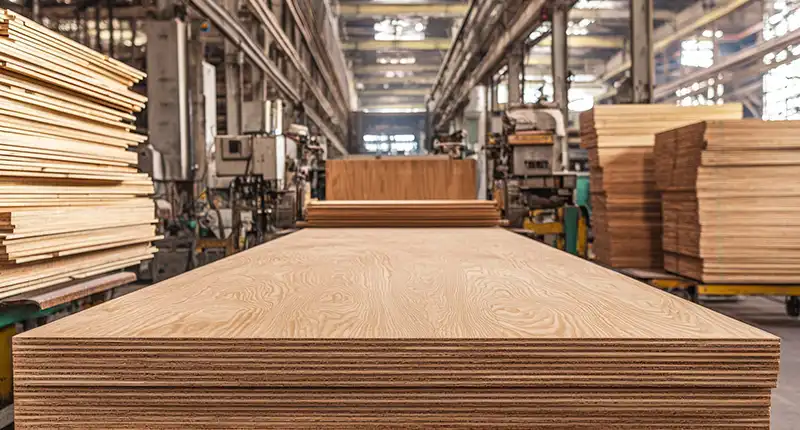
- New
- October 23, 2025
How Fiber Cement Board Compares with Plywood & Gypsum in the UAE Market
Every construction project in the UAE requires materials that can endure extreme heat, coastal humidity, and use over time. Common choices include plywood, gypsum board, and the up-and-coming fiber cement board (also known as the rising star). These types of products, like Geminite, are becoming popular due to their reliability and durability. But what is the comparison of these boards in real life? Which one is the best value for UAE builders and homeowners?
In this blog, we will take a closer look at all three, comparing them in terms of durability, fire resistance, moisture performance, and cost-effectiveness. At the end of it, you’ll be able to identify which material is most suitable for your project.
At a Glance
- 1. Unmatched Durability in a Harsh Climate
- 2. Superior Fire Resistance for Enhanced Safety
- 3. Excellent Resistance to Moisture and Humidity
- 4. Versatility in Design and Application
- 5. A Commitment to Sustainable Construction
- Conclusion: Building for a Resilient Futurem
- Building with Confidence in the UAE
- Frequently Asked Questions (FAQs)
Why Fiber Cement Board Shines in the UAE?
A lot of contemporary construction assignments use fiber cement boards. It is durable and flexible; its application can be both in the interior and exterior of the house. Let’s understand the reasons for its success over conventional boards in the UAE.
Durability & Weather Resistance
It’s fiber cement boards, no doubt. These boards are constructed using cement, sand, and cellulose fibers, designed to resist rot, damaging termites, and extreme weather. They are more durable and impact-resistant than gypsum boards. It’s universally accepted; however, fiber cement boards are heavier than gypsum boards.
In the UAE, where summer heat waves and the coastal air are heavily infused with salt, the air can be submerged in brine, the salt can form, and the vapor can separate. Unlike plywood, which warps, or gypsum cracks, the cement fiber will remain unchanged.
Premier Moisture & Fire Control
Moisture is a familiar foe in bathrooms, kitchens, and outside spaces. The gypsum softens very quickly when wet, and the plywood tends to become swollen. However, fiber cement boards also come in water-resistant or waterproof versions. This makes them the preferred material for high moisture applications.
Additionally, they are non-combustible, a significant plus point in an area where fire safety is taken seriously.
Long-Lasting Value
Although there’s an upfront cost with these boards, they will actually save money over the entire lifespan of the construction project due to the money saved on maintenance and their lower replacement cost.
The ROI is even higher than usual for property owners since they save on maintenance for decades because the boards require so little upkeep. Making the payment means safety and security for the years that follow the payment.
Plywood: Familiar but With Trade-Offs
Plywood has been part of construction practices for many decades. Even today, builders across the UAE continue to use this material for its strength and cost affordability. But for today’s ambitious projects, is it the best material available? Let’s explore this.
Strong Structural Support
Plywood is well known for its structural strength, a key advantage. Plywood provides lateral stability readily, which is vital for load-bearing components.
It, therefore, is an ideal material for use in flooring, furniture, and other constructions where the weight of the structure is critical.
Moisture & Fire Limits
Plywood is lacking in only two areas: water and fire. In the absence of chemical treatment, plywood readily absorbs moisture. In the UAE, the potential for swelling, warping, and fungal growth, which is highly problematic in humid areas, is alarming.
Fire is the other constraint: Plywood is naturally flammable and requires other coatings to meet safety standards.
Low Price, High Maintenance
Plywood is generally cheaper to purchase than fiber cement. But when maintenance, waterproofing, and possible replacements are considered, the savings are reduced.
Plywood is also not so attractive for long-term projects in the UAE climate because of the “cheap now, more expensive later factor.”

Gypsum: Light, Easy, And Fragile
Gypsum board (also known as drywall) is another standard building material. It is pretty popular in the UAE for interior partitions and ceilings due to its lightweight and low cost. But like plywood, it is limited.
Lightweight & Easy to Install
In the construction business, every minute counts. Moreover, the lightweight and strong composition of gypsum boards, ideal for quick installations, helps in substantially cutting repair and reinstallation costs. Hence, the manual labor in the process is nearly zero, further increasing the ease of installing such boards.
Contractors like its smooth finish, which will require less preparation before painting or papering. As a result, it is well-suited to accelerated interior projects.
Poor in Moisture and Impact Zones
Insulated Gypsum panels do not warp, develop mold, or suffer from structural failures, as per the different ‘humid’ zones. They do not absorb water, hence they can be used in bathrooms, kitchens, and even in coastal and tropical climates.
Affordable, But Short-Lived
Gypsum is one of the most inexpensive possibilities for interiors. However, its brief lifespan and replacement expenses can easily offset the initial savings. For projects that are more permanent in nature, gypsum may not last long.
Comparative Snapshot
Before deciding, it helps to see the three materials side by side. Let’s look at some strengths and weaknesses of UAE’s market:
Feature | Fiber Cement Board | Plywood | Gypsum Board |
Durability | Extremely durable, rot-proof, pest-proof | Strong, but swells/rots if damp | Fragile; prone to cracks and dents |
Moisture Resistance | High; water-resistant/waterproof options | Limited unless treated | Very low; not suited for wet zones |
Fire Resistance | Non-combustible, superior safety | Flammable, needs treatments | Fire-resistant, but weak in extreme heat |
Installation | Heavy, requires skilled labor | Medium weight, easy for carpenters | Very light, DIY-friendly |
Cost & Value | Higher upfront, excellent long-term ROI | Lower cost, higher maintenance | Very low cost, frequent replacements |
Best UAE Applications | Exteriors, wet areas, high-durability projects | Dry interiors, structural applications | Dry interiors, ceilings, budget projects |
Why Choose Geminite?
There is no homogeneous Fiber Cement Board, and the one from Geminite is tailored to the climate and construction practices of the UAE. It is durable, fire and moisture resistant, and has a smooth surface ideal for internal and external uses.
Homeowners and builders use Geminite due to its ability to:
- Resists heat, dampness, and weather at the coast without warping.
- It is non-combustible, which promotes superior fire protection.
- Sheets up well compared to plywood and gypsum in damp or high-traffic areas.
- Provides long-term value at low maintenance.
Geminite is the smarter choice when it comes to strength, reliability, and the modern design of your next project.
When you are seeking durability, safety, and value over the long term, fiber cement board is the wise choice.
Need to change up your project with the correct materials? Get in touch with Geminite today to receive professional advice and custom service.
FAQ’s
- Is fiber cement board better than gypsum in the UAE?
Yes. Fiber cement board is more resistant to moisture, pests, and fire than gypsum. It is more appropriate for exterior, wet, and long-term projects in the UAE.
- Can plywood be used outdoors in Dubai?
Plywood can be applied outside, just like it is a chemically treated and sealed surface. Otherwise, it distorts, inflames, or decays easily in the humidity and sea air of Dubai.
- Which material is most cost-effective long-term?
Fiber cement board has the most optimum life-cycle value, although it is expensive. Its longevity lowers repair and replacement costs for decades.
- Is gypsum board safe for bathrooms?
Gypsum should not be used in the bathroom since it takes in water and loses its strength with time. Even the moisture-resistant gypsum does not perform as well as the fiber cement board does in wet zones.
- Which board is easiest to install for quick projects?
Gypsum board can be cut easily, is lightweight, and is installed quickly, making it ideal for dry interior partitions. Although stronger, fiber cement takes more skilled hands and heavier tools to install.